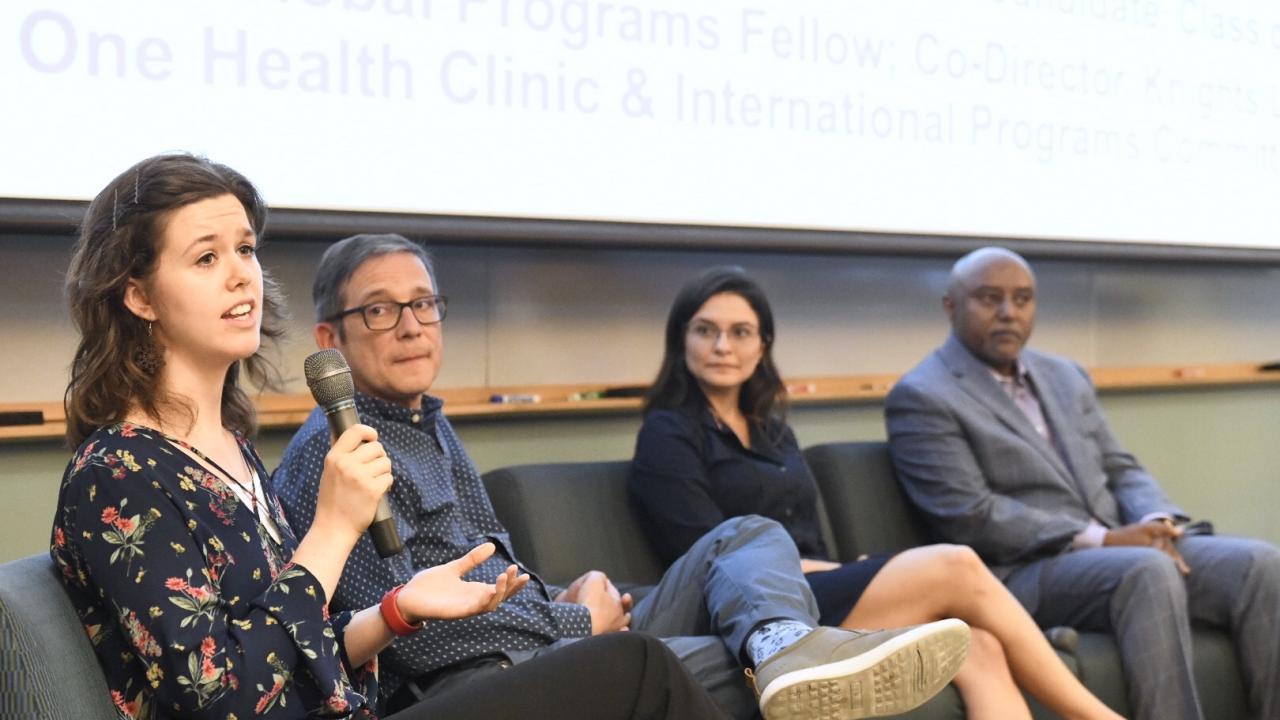
The Value of Cultural Awareness: 2nd Annual Global Programs Day
The school’s second annual Global Programs Day, held on September 12, focused on the importance of cultural awareness. Whether working at the Knight’s Landing One Health Clinic just 30 minutes from the Davis campus or in a village in Tanzania, developing this awareness can help veterinarians be successful in their careers. The day's events were partnered with UC Davis Global Affairs.
A noon-time panel session kicked off with introductions by Dean Michael Lairmore and a brief talk by Associate Vice Provost of Global Education and Services Fadi Fathallah. Dr. Pat Conrad, associate dean for Global Programs and Co-Director of the UC Global Health Institute, moderated the panel discussion, which provided veterinary students and others in the audience with perspectives on integrating cultural awareness.
Panel participants included:
Dr. Wondwossen Gebreyes, DVM, PhD Diplomate ACVPM - Executive Director, Ohio State Global One Health Initiative
Dr. Fernanda Ferreira, DVM, MS, PhD - Assistant Specialist in Cooperative Extension for Dairy Cattle Production Health Management, UC Davis School of Veterinary Medicine
Dr. Michael S. Kent, MAS, DVM, DACVIM, DACVR - Director, Center for Companion Animal Health; Professor, Surgical and Radiological Sciences, UC Davis School of Veterinary Medicine
Amanda Crofton, BS, BA, DVM candidate, SVM Class of 2021 - SVM Global Programs Fellow; Co-Director, Knights Landing One Health Clinic and International Programs Committee Representative
Gebreyes, who grew up in an urban farming area in Ethiopia highlighted the need for communication to gain cultural competency. Even in his home country, he encountered cultural differences between his community and the rural pastoral villages where he began to work after obtaining his DVM. “Cultural awareness is important not just for international travel, but in diverse communities in your own country,” he said.
Crofton echoed that experience. As an undergrad, she began volunteering at the Knights Landing One Health Clinic in a rural agricultural area just 30 minutes north of Davis. She found that speaking Spanish and making the effort to learn the language of people she was helping made a big difference in how they opened up to her. “Learning some of the language and expressing an interest helps reduce barriers to health care.” She now serves as the co-director for the clinic.
Ferriera grew up in southeast Brazil, a well-developed region. After graduating with her DVM, she went to work for the government in a remote area of the Amazon with dairy cattle. Some of her first impressions were shock when she saw people reusing disposable needles. She said she learned to put aside her feelings of judgement and instead ask why. The reason was simple—in this remote location, there weren’t enough supplies and they were not easily accessible. “This helped me to hold my first reactions and leave room for hearing other’s perspectives. I learned to ask a lot of whys to help me understand others.”
Kent came from New York to California where he found everything to be different. He shared an experience when he lectured in China to other faculty members and graduate students. He talked about radiation causing an increased risk of cancer. That launched concerns about the technicians using their hands to hold a patient during x-rays. He agreed with other panelists that leaving your comfort zone is vital if you’re interested in global work.
An evening program presented videos from 12 DVM students who participated in fellowships and externships thanks to generous donors to the Office of Global Programs. In total, Global Programs awarded $56,020 for 1st and 2nd year veterinary students to engage in collaborative research projects and externships in Tanzania, Thailand, Indonesia, Namibia, Australia, Taiwan, United Kingdom and the Cook Islands. In addition, senior veterinary students conducted approved global externship experiences this quarter in England, Japan, Dominican Republic, New Zealand, Canada and Australia.
